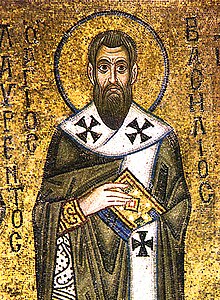St. Basil was born around the year 329, and served as the Bishop of Caesarea. Before becoming bishop, Basil founded what is most likely the first monastery in Asian Minor, and his principles still influence Eastern monasticism today.
Throughout the fourth century, he defended the Oriental Church from heresies, especially Arianism, which denied Christ’s divine nature. Basil was one of the “Three Cappadocians,” along with his brother Gregory of Nyssa and Gregory of Nazianzus. As part of the trio, he provided practical genius and theological writings.
The Emperor Valens put great pressure on Basil to drop his efforts against Arianism, and allow heretics to receive communion. Basil refused, and the emperor eventually backed down. But when St. Athanasius died, Basil was left as the only defender of the faith. He worked tirelessly to rally fellow Catholics, but misunderstandings and misrepresentations led to him being accused of heresy himself.
Basil was known for his pastoral work. He preached twice a day, built a hospital, and tried to bring an end to prostitution.
St. Basil’s writings were not widely recognized during his lifetime, but after his death, he was named a Doctor of the Church.
Start your day with Always Forward, our award-winning e-newsletter. Get this smart, handpicked selection of the day’s top news, analysis, and opinion, delivered to your inbox. Sign up absolutely free today!

